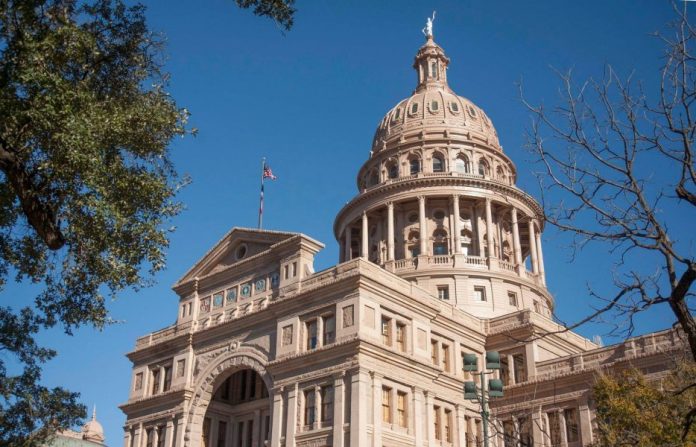The Texas House gave initial approval early Thursday to a bill that would create a $1 billion private school voucher program, crossing a historic milestone and bringing Gov. Greg Abbott’s top legislative priority closer than ever to reaching his desk.
The lower chamber signed off on its voucher proposal, Senate Bill 2, on an 85-63 vote. Every present Democrat voted against the bill. They were joined by two Republicans.
“This is an extraordinary victory for the thousands of parents who have advocated for more choices when it comes to the education of their children,” Abbott said in a statement, vowing that he would “swiftly sign this bill into law” when it reached his desk.
The vote came more than 10 hours after the chamber gave preliminary approval to its sweeping $7.7 billion school funding package, which would give local districts more money per student and raise teacher salaries. House Bill 2, which passed on a 144-4 vote, also aims to improve the quality of special education services by allocating funding based on the individual needs of children with disabilities.
The landmark voucher vote marks the first time since 1957 that the Texas House has approved legislation making state money available for families to use on their children’s private schooling. The outcome validated Abbott’s crusade to build a pro-voucher House majority during last year’s primary by targeting Republicans who tanked his previous proposal in 2023. Now, all that is left is for Republicans in both chambers to iron out the differences between their voucher plans.
The House’s plan would put $1 billion to create education savings accounts, a form of vouchers that families could use to pay for private school tuition and other school-related expenses, like textbooks, transportation and therapy. The bill would tie the voucher program’s per-student dollars to public education funding so the amount available to each participating student would increase when public schools receive more money and dip when public education funding declines.
If public demand exceeds the program’s capacity, students with disabilities and families defined by House lawmakers as low income would be prioritized — though they would not be guaranteed admission to any private school.
After Thursday’s vote, the House will still need to cast a final vote to approve both the voucher and school spending bills, largely a formality. The measures would then head to the Senate. At that point, members from both chambers would work to reconcile the differences in their voucher proposals in a closed-door conference committee. The biggest differences center on how much money participating students should receive, which applicants should take priority and how the program should accommodate students with disabilities.
The House debate on vouchers started Wednesday afternoon and ended early Thursday. Lawmakers changed a provision in the bill that would have limited funding for people without disabilities or from wealthier households — defined as a family of four making about $156,000 or greater — to only 20% of the program’s total budget until after the 2026-27 school year. The 20% cap would now apply to each year of the potential voucher program.
The bill now also requires private schools to have existed for at least two years before joining the program; grants the state auditor more power to review the activities of organizations contracted to administer the program; and requires the state’s annual report on the program to include dropout, expulsion and graduation data on participating students with disabilities — broken down by grade, age, sex and race or ethnicity.
Wednesday’s debate over SB 2 covered many of the talking points for and against vouchers echoed throughout the legislative session.
Republicans sought to assure their colleagues that the bill would prioritize low-income children and students with disabilities. Democrats noted that the legislation imposes no admission requirements on private schools, meaning they can deny any student, even those the state wants first in line for the program.
SB 2 would prevent any student whose parent cannot prove that the child is a U.S. citizen or that the child lawfully resides in the country from participating in the program. Several lawmakers raised questions about what state entity would be responsible for checking the children’s citizenship, how the legislation would protect the privacy of applicants and whether it would accommodate students who may find it difficult to access certain documents.
The House also gave initial approval to its priority school funding legislation. Two years ago, public schools missed out on nearly $8 billion, which Abbott had made conditional on the approval of vouchers.
This year’s public education spending bill would increase schools’ base funding by $395 — from $6,160 to $6,555. That amount, known as the basic allotment, would automatically go up every two years by tying it to property value growth. Forty percent of the allotment would go to non-administrative staff salaries, with higher pay increases reserved for teachers with more than a decade of classroom experience.
In addition, the bill would limit schools’ use of educators who lack formal classroom training, barring uncertified teachers from instructing core classes. It would change the current settings-based model for special education funding by providing schools money based on the individual needs of students with disabilities. Two students placed in the same classroom but who require different levels of support receive the same dollars under the current settings-based model.
Republicans, during hours of debate, celebrated the bill as a worthwhile investment in public education. Democrats also voiced support for the legislation but argued that it barely scratches the surface of what districts need. Many school districts are currently grappling with challenges ranging from budget deficits and teacher shortages to campus closures.
Upon final passage, HB 2 will go to the Senate for further consideration. That chamber has already passed a number of similar school funding proposals — though top lawmakers there have expressed opposition to increasing schools’ base funding this session.
The basic allotment offers districts flexibility to address their campuses’ unique needs, including staff salaries, utilities and maintenance. The Senate has instead advocated for more targeted funding in areas like teacher pay, school security and special education.
“As we await the reconciliation of the House and Senate versions of the Education Savings Account legislation, we want to reaffirm that Lewisville ISD remains steadfast in our commitment to serving all students,” said Lewisville ISD Superintendent Dr. Lori Rapp in a statement. “We continue to actively engage with our legislators, advocating for an increase to the Basic Allotment—which has remained unchanged since 2019—to help schools meet the rising costs of inflation. While fully addressing inflation would require an increase of $1,340, we greatly appreciate the House’s recognition of this need. HB2, which proposes a maximum $395 increase to the Basic Allotment, represents an important step toward reinvesting in our public schools.”
BIG NEWS, TEXAS. The Texas House made history by passing SB 2, our universal school choice program.
This puts Texas on a pathway to become the best state in America for educating our kids.
More: https://t.co/0GDtXhl8FA pic.twitter.com/B1uszDriLc
— Governor Abbott Press Office (@GovAbbottPress) April 17, 2025
By Jaden Edison and Jasper Scherer. This article originally appeared in The Texas Tribune at https://www.texastribune.org/2025/04/17/texas-house-school-vouchers-public-education-funding/.













